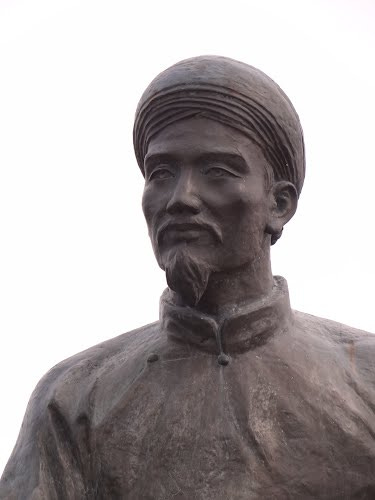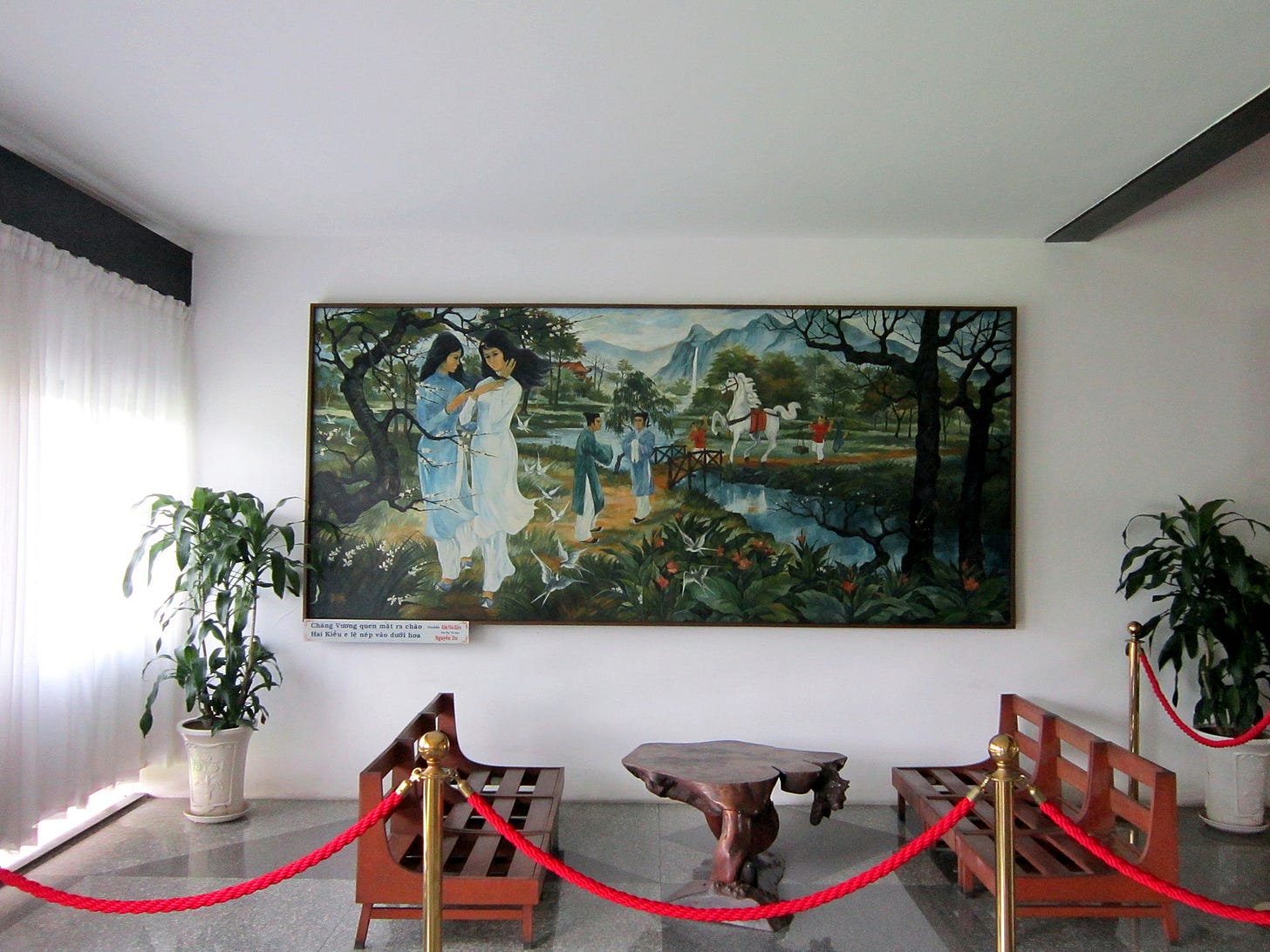Tale of Kiều — A Timeless Cultural Heirloom
A brief analysis of Tale of Kiều by Nguyễn Du and its impact on the Vietnamese people.
At the start of his brilliant bilingual edition of Nguyễn Du’s Tale of Kiều, Huỳnh Sanh Thông wrote:
"Tặng đồng bào tị nạn Việt Nam cùng thân hữu khắp thế giới"
"To Vietnamese refugees and their friends throughout the world."
If anyone understood what being exiled feels like, it would be Nguyễn Du (and, to some extent, Huỳnh Sanh Thông). Nguyễn Du lost both of his parents at a young age. And when his adult life began, seemingly with a bright future ahead, Vietnam’s political scene changed dramatically. As a result, Nguyễn Du was homeless for a short time and then travelled across China from 1788 to 1790 before returning to a country in continuous turmoil.
I don’t think Nguyễn Du ever truly healed from the trauma he endured, at least not until he wrote Truyện Kiều (傳翹, or Tale of Kiều).
You may have never heard about Tale of Kiều, also known as Đoạn Trường Thanh Tâm (斷腸新聲, “A New Cry from a Broken Heart”), or Nguyễn Du. And yet, this work has endured from its publication in 1820 till today and gained the reputation of a literary favourite to many generations of the Vietnamese people. Sadly, Nguyễn Du never saw his work received by the public, rise in popularity and take hold of the nation’s consciousness and beyond.
Thanks to its lục bát, or “six-eight”, verse form and being written in Chữ Nôm, or “Southern Script”, the predecessor of the modern Vietnamese written texts (or Chữ Quốc Ngữ), the 3,254 verses of the epic poem first spread among the Vietnamese population primarily through word of mouth. The work became popular not only with peasants but also with the elites. A rare copy of the 1894 edition, most likely published under the direction of Emperor Tự Đức of the Nguyễn Dynasty, is now held by the British Library.
Since then, Tale of Kiều has been translated into 16 languages. It is Vietnam’s best-known work to date. This timeless classic has been called a “national heirloom” by not just Vietnamese historians but those who are interested in Vietnam and our thousands of years of history. The poem is so popular that some of its characters and languages found their way into everyday life — not so dissimilar to Shakespeare’s long-lasting impact on the English language.
During his times in China, Nguyễn Du came across a seventeenth-century Chinese novel called Jīn Yún Qiào (金雲翹, or Kim Vân Kiều in Vietnamese), which was written by an unknown writer under the pseudonym Qīngxīn Cáirén (青心才人, “Pure-Hearted Man of Talent”). Nguyễn Du took the source materials, a known but mediocre talent-beauty novel, elevated one of its characters and made her a heroine by her own rights.
However, do not mistake Tale of Kiều for a cheap remake of its original inspiration. Despite being based on historical characters who lived in Ming China, the characters featured in Tale of Kiều are not accurate representations of such people. Instead, thanks to Nguyễn Du, Tale of Kiều became quintessentially Viet — a story about a victim of sex trafficking who sings her songs of homesickness and exile, overcomes and crossovers to eventually become a queen.
“Viet originally meant to cross over – like an obstacle – to overcome. So this is the essence of the Vietnamese spirit. Now Viet just means ‘people’, though its real meaning is ‘the people who overcome, who cross over’."
Phạm Duy, a prolific Vietnamese songwriter.
As of this writing, approximately 5.3 million Vietnamese live overseas. The largest wave of migration happened after the 1975 Fall of Saigon. Younger generations leave hoping for better education and more opportunities and depending on where life takes us, some of us leave for good. Tale of Kiều speaks to us and for us, as it’s a story about our yearning for a home from far away, for the hardships we endure and our eventual triumph, for the sense of loss and of a destiny that cannot be changed.
When examining Tale of Kiều, we also need to talk about how it was dangerous for Nguyễn Du to have written the poem while serving his emperor as a high-ranking mandarin. First, the poem was written in Southern Script when Classic Chinese was still used in all official capacities. Secondly, like other great literary works, Tale of Kiều can be perceived differently by different audiences. It has been speculated that Tale of Kiều is a criticism of Confucianism values and Nguyễn Du’s mourning for his fallen Lê dynasty. The Nguyễn emperor commented, “If the author had not already died, he would have had him executed for treason.” Tale of Kiều was published post-mortem after Nguyễn Du’s death at the age of 54. Not unlike Qīngxīn Cáirén, who wrote Jīn Yún Qiào during a time when Chinese emperors severely persecuted poets and writers, Nguyễn Du created his most famous work in secret.
On the other hand, the poem is about the sufferings of a young and talented figure. The story is so universal that many political movements have claimed it for themselves. From feudal mandarins like Phạm Quỳnh, a pro-French 20th-century Vietnamese scholar, having declared “As long as ‘Tale of Kiều’ lasts, our language shall last. And as long as our language endures, our nation shall live on.”, to Communists and their South Vietnam counterpart. At the end of the day, this work is Vietnam’s legacy; it belongs to its people across time and space.
Furthermore, Tale of Kiều is also a story about women and the marginalised. Through his vividly described imagery, Nguyễn Du showed us the difficulties of shame and the journey to find happiness. As we follow the life of Kiều, we see Nguyễn Du’s projection of his own life, its ups and downs, as well as his grief for what he had lost. We share our fears, sadness, doubts and ultimately, our hopes with them. Yet, despite everything, we can choose joy in a world of sufferings, however difficult.
Tale of Kiều embodies not just Vietnam’s history but also the country’s complicated relationship with China and the essence of the Vietnamese people. And yet, the younger generations of the Viet diaspora and their friends are likely to have never heard of the name Nguyễn Du or the significance of Kiều and her story.
I, too, mourn for that loss.
More readings:
The Tale of Kiều — A Bilingual Edition, translated by Huỳnh Sanh Thông
The Kim Van Kieu of Nguyen Du — Translated by Vladislav Zhukov
The Song of Kieu: A New Lament — Reworked into English by Timothy Allen





